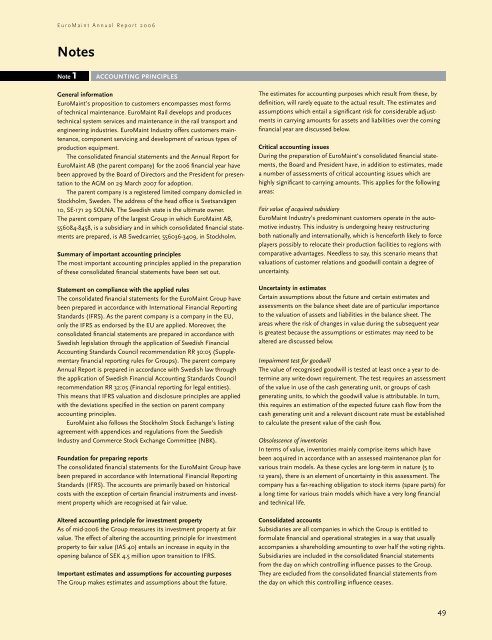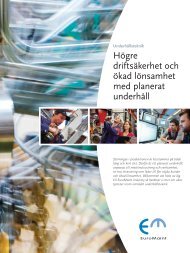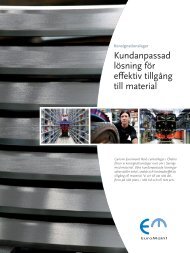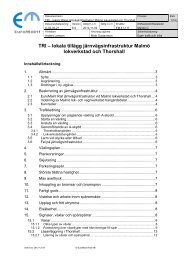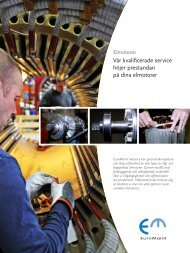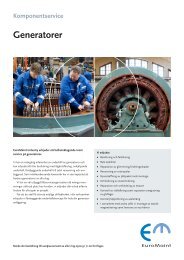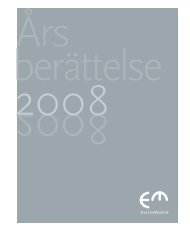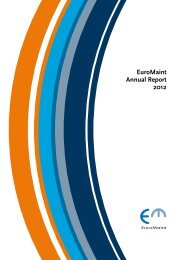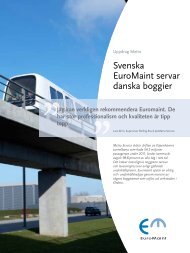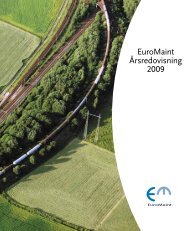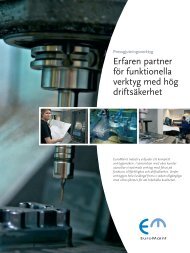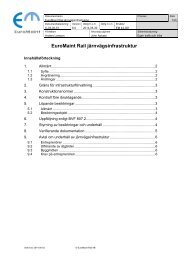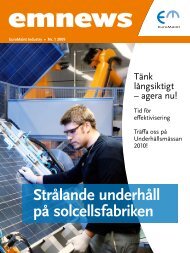Annual Report 2006 (pdf) - EuroMaint Rail
Annual Report 2006 (pdf) - EuroMaint Rail
Annual Report 2006 (pdf) - EuroMaint Rail
You also want an ePaper? Increase the reach of your titles
YUMPU automatically turns print PDFs into web optimized ePapers that Google loves.
E u r o M a i n t A n n u a l R e p o r t 2 0 0 6<br />
Notes<br />
Note 1<br />
Accounting principles<br />
General information<br />
<strong>EuroMaint</strong>’s proposition to customers encompasses most forms<br />
of technical maintenance. <strong>EuroMaint</strong> <strong>Rail</strong> develops and produces<br />
technical system services and maintenance in the rail transport and<br />
engineering industries. <strong>EuroMaint</strong> Industry offers customers maintenance,<br />
component servicing and development of various types of<br />
production equipment.<br />
The consolidated financial statements and the <strong>Annual</strong> <strong>Report</strong> for<br />
<strong>EuroMaint</strong> AB (the parent company) for the <strong>2006</strong> financial year have<br />
been approved by the Board of Directors and the President for presentation<br />
to the AGM on 29 March 2007 for adoption.<br />
The parent company is a registered limited company domiciled in<br />
Stockholm, Sweden. The address of the head office is Svetsarvägen<br />
10, SE-171 29 SOLNA. The Swedish state is the ultimate owner.<br />
The parent company of the largest Group in which <strong>EuroMaint</strong> AB,<br />
556084-8458, is a subsidiary and in which consolidated financial statements<br />
are prepared, is AB Swedcarrier, 556036-3409, in Stockholm.<br />
Summary of important accounting principles<br />
The most important accounting principles applied in the preparation<br />
of these consolidated financial statements have been set out.<br />
Statement on compliance with the applied rules<br />
The consolidated financial statements for the <strong>EuroMaint</strong> Group have<br />
been prepared in accordance with International Financial <strong>Report</strong>ing<br />
Standards (IFRS). As the parent company is a company in the EU,<br />
only the IFRS as endorsed by the EU are applied. Moreover, the<br />
consolidated financial statements are prepared in accordance with<br />
Swedish legislation through the application of Swedish Financial<br />
Accounting Standards Council recommendation RR 30:05 (Supplementary<br />
financial reporting rules for Groups). The parent company<br />
<strong>Annual</strong> <strong>Report</strong> is prepared in accordance with Swedish law through<br />
the application of Swedish Financial Accounting Standards Council<br />
recommendation RR 32:05 (Financial reporting for legal entities).<br />
This means that IFRS valuation and disclosure principles are applied<br />
with the deviations specified in the section on parent company<br />
accounting principles.<br />
<strong>EuroMaint</strong> also follows the Stockholm Stock Exchange’s listing<br />
agreement with appendices and regulations from the Swedish<br />
Industry and Commerce Stock Exchange Committee (NBK).<br />
Foundation for preparing reports<br />
The consolidated financial statements for the <strong>EuroMaint</strong> Group have<br />
been prepared in accordance with International Financial <strong>Report</strong>ing<br />
Standards (IFRS). The accounts are primarily based on historical<br />
costs with the exception of certain financial instruments and investment<br />
property which are recognised at fair value.<br />
Altered accounting principle for investment property<br />
As of mid-<strong>2006</strong> the Group measures its investment property at fair<br />
value. The effect of altering the accounting principle for investment<br />
property to fair value (IAS 40) entails an increase in equity in the<br />
opening balance of SEK 4.5 million upon transition to IFRS.<br />
Important estimates and assumptions for accounting purposes<br />
The Group makes estimates and assumptions about the future.<br />
The estimates for accounting purposes which result from these, by<br />
definition, will rarely equate to the actual result. The estimates and<br />
assumptions which entail a significant risk for considerable adjustments<br />
in carrying amounts for assets and liabilities over the coming<br />
financial year are discussed below.<br />
Critical accounting issues<br />
During the preparation of <strong>EuroMaint</strong>’s consolidated financial statements,<br />
the Board and President have, in addition to estimates, made<br />
a number of assessments of critical accounting issues which are<br />
highly significant to carrying amounts. This applies for the following<br />
areas:<br />
Fair value of acquired subsidiary<br />
<strong>EuroMaint</strong> Industry’s predominant customers operate in the automotive<br />
industry. This industry is undergoing heavy restructuring<br />
both nationally and internationally, which is henceforth likely to force<br />
players possibly to relocate their production facilities to regions with<br />
comparative advantages. Needless to say, this scenario means that<br />
valuations of customer relations and goodwill contain a degree of<br />
uncertainty.<br />
Uncertainty in estimates<br />
Certain assumptions about the future and certain estimates and<br />
assessments on the balance sheet date are of particular importance<br />
to the valuation of assets and liabilities in the balance sheet. The<br />
areas where the risk of changes in value during the subsequent year<br />
is greatest because the assumptions or estimates may need to be<br />
altered are discussed below.<br />
Impairment test for goodwill<br />
The value of recognised goodwill is tested at least once a year to determine<br />
any write-down requirement. The test requires an assessment<br />
of the value in use of the cash generating unit, or groups of cash<br />
generating units, to which the goodwill value is attributable. In turn,<br />
this requires an estimation of the expected future cash flow from the<br />
cash generating unit and a relevant discount rate must be established<br />
to calculate the present value of the cash flow.<br />
Obsolescence of inventories<br />
In terms of value, inventories mainly comprise items which have<br />
been acquired in accordance with an assessed maintenance plan for<br />
various train models. As these cycles are long-term in nature (5 to<br />
12 years), there is an element of uncertainty in this assessment. The<br />
company has a far-reaching obligation to stock items (spare parts) for<br />
a long time for various train models which have a very long financial<br />
and technical life.<br />
Consolidated accounts<br />
Subsidiaries are all companies in which the Group is entitled to<br />
formulate financial and operational strategies in a way that usually<br />
accompanies a shareholding amounting to over half the voting rights.<br />
Subsidiaries are included in the consolidated financial statements<br />
from the day on which controlling influence passes to the Group.<br />
They are excluded from the consolidated financial statements from<br />
the day on which this controlling influence ceases.<br />
49


